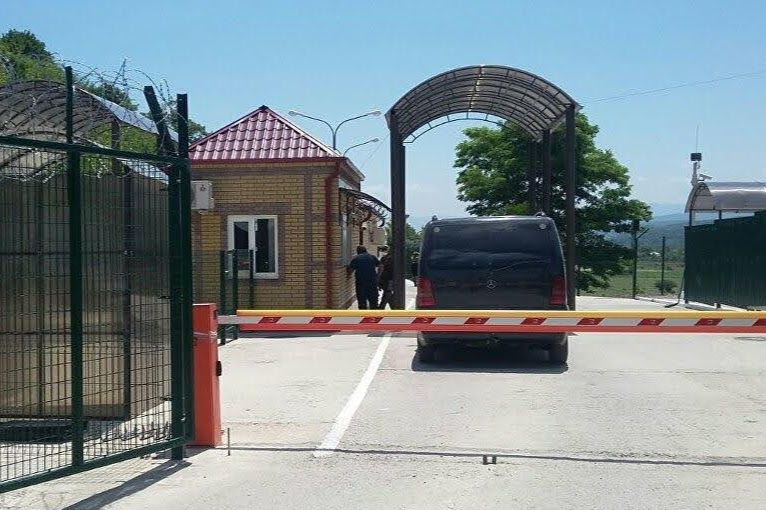Ethnic Georgians residing in Abkhazia and South Ossetia will be unable to cross into Tbilisi-controlled territories to cast their ballots on Saturday due to the closure of three crossing points.
In the lead-up to Georgia’s parliamentary elections on 26 October, Abkhazia and South Ossetia have limited crossing points with the Georgian government-controlled territory, claiming security concerns.
The decision will effectively bar the ethnic Georgian population — estimated at over 30,000 in the Gali (Gal) region of eastern Abkhazia and up to 1,000 in the Akhalgori (Leningor) region of southeastern South Ossetia — from casting their ballots in Saturday’s parliamentary vote.
On Wednesday, local media reported that South Ossetian President Alan Gagloev had discussed ‘security issues’ with his law enforcement officials, citing a ‘tense internal situation’ with South Ossetia’s ‘southern neighbours’. Gagloev’s office also reported that he had ordered ‘heightened security measures’ at the checkpoints that cross into Tbilisi-controlled areas.
‘There could be provocations directed towards South Ossetia and Abkhazia, both at the borders and within both states’, Gagloev said as he reportedly ordered ‘heightened security measures’ at the Mosabruni (Razdakhan) and Perevi (Pereu) crossings.
Both crossing points had recently been operating only during the last week and a half of each month.
Last Friday, Abkhazia announced it was ‘closing the border with Georgia’ from 23-30 October, following a meeting of the Security Council chaired by Abkhazia’s President Aslan Bzhaniya. The announcement said that the restriction to limit crossings at the Enguri (Ingur) checkpoint would not impact ‘Abkhazian citizens and residents with residence permits’ returning to Abkhazia. The reference to residence permit holders was meant to highlight the thousands of ethnic Georgians in Gali who, in addition to being excluded from Georgia’s political life, have also been denied the right to hold Abkhazian citizenship and, consequently, the right to vote in Abkhazia’s elections.
According to RFE/RL, following the 18 October announcement, ethnic Georgians residing in Gali formed queues at the Enguri bridge in order to cross into the neighbouring Samegrelo region before the checkpoint closed. They intend to reside in Samegrelo until the end of the election in order to vote on 26 October.
On Tuesday, the Georgian rights group Democracy Research Institute (DRI) voiced suspicion that the Abkhazian authorities deliberately prevented ethnic Georgians, who are believed to overwhelmingly support Georgian Dream’s rivals in the race, from participating in the Georgian parliamentary elections. DRI also cited reports from Gali residents who speculated that the closure of the crossing points was a coordinated move agreed upon by both Abkhazian and Georgian authorities.
The same day, the Secretary of Abkhazia’s Security Council, Raul Lolua, announced the deployment of ‘additional security agencies units’ in the Gali district, citing Georgia’s parliamentary elections and respective orders from Bzhaniya.
Lolua’s announcement followed last week’s report from his agency and the Russian FSB — responsible for border security in Abkhazia — that they had intercepted a drone in Bgoura, a village in the Gali district. According to Lolua, the drone was operated by a ‘participant in the war in Ukraine on the side of the Ukrainian Armed Forces’, who was residing in Georgia.
Davit Katsarava, leader of the Georgian vigilante group Anti-Occupation Movement — Power in Unity, quickly confirmed that the downed drone mentioned by Abkhazian authorities was operated by his group, indicating that they were referring to him.
Without specifying, Lolua further claimed on Wednesday that ‘some Georgian politicians’ were calling for maximum mobilisation of the army, and reiterated the possibility of a ‘second front’ being opened in relation to Abkhazia.
For ease of reading, we choose not to use qualifiers such as ‘de facto’, ‘unrecognised’, or ‘partially recognised’ when discussing institutions or political positions within Abkhazia, Nagorno-Karabakh, and South Ossetia. This does not imply a position on their status.




 23 October 2024
23 October 2024



